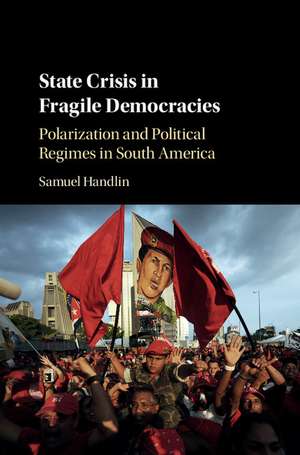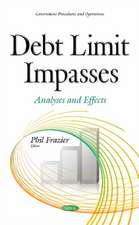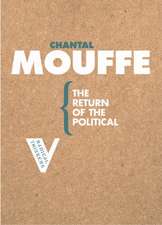State Crisis in Fragile Democracies: Polarization and Political Regimes in South America
Autor Samuel Handlinen Limba Engleză Hardback – 25 iul 2017
| Toate formatele și edițiile | Preț | Express |
|---|---|---|
| Paperback (1) | 289.57 lei 6-8 săpt. | |
| Cambridge University Press – 15 mai 2019 | 289.57 lei 6-8 săpt. | |
| Hardback (1) | 696.80 lei 6-8 săpt. | |
| Cambridge University Press – 25 iul 2017 | 696.80 lei 6-8 săpt. |
Preț: 696.80 lei
Preț vechi: 782.92 lei
-11% Nou
Puncte Express: 1045
Preț estimativ în valută:
133.35€ • 138.70$ • 110.09£
133.35€ • 138.70$ • 110.09£
Carte tipărită la comandă
Livrare economică 14-28 aprilie
Preluare comenzi: 021 569.72.76
Specificații
ISBN-13: 9781108415422
ISBN-10: 1108415423
Pagini: 332
Dimensiuni: 158 x 235 x 23 mm
Greutate: 0.59 kg
Editura: Cambridge University Press
Colecția Cambridge University Press
Locul publicării:New York, United States
ISBN-10: 1108415423
Pagini: 332
Dimensiuni: 158 x 235 x 23 mm
Greutate: 0.59 kg
Editura: Cambridge University Press
Colecția Cambridge University Press
Locul publicării:New York, United States
Cuprins
Part I. Puzzles and Theoretical Explanations: 1. State crises, the left, and democracy in contemporary South America; 2. Explaining divergent party system trajectories and regime dynamic; Part II. Venezuela and Brazil: 3. Venezuela: development of a highly polarizing party system; 4. Brazil: development of a weakly polarizing party system; 5. Democratic erosion in Venezuela, representative democracy in Brazil; Part III. Perspectives across South America: 6. Bolivia and Ecuador: high polarization and democratic erosion; 7. Chile and Uruguay: low polarization and representative democracy; 8. Paraguay and Peru: low polarization and polyarchy; Part IV. Conclusion: 9. Longer-term legacies and comparative perspectives around the world; Appendix A. Operationalization of state crisis and left-wing infrastructure; Appendix B. Operationalization of polarization and regime categories; Bibliography; Index.
Recenzii
'Latin America's 'Left Turn' produced strikingly diverse outcomes, ranging from moderate reform and stable democracy in Chile and Uruguay to polarization and democratic erosion in Ecuador and Venezuela. Although numerous studies have sought to explain this variation, State Crisis in Fragile Democracies stands out as the best. Building on Guillermo O'Donnell, Handlin's book highlights the centrality of the state in shaping party system and regime outcomes in Latin America. It demonstrates with impressive rigor that it was state crisis - not public opposition to neoliberalism, the weakness of political parties or commodity rents - that drove polarizing populism and democratic crisis in Bolivia, Ecuador, and Venezuela. This book will make an enduring contribution to our understanding of contemporary populism and political regimes. I recommend it to all students of Latin American politics.' Steven Levitsky, Harvard University, Massachusetts
'State Crisis in Fragile Democracies: Polarization and Political Regimes in South America is a major work on some of the most politically and theoretically important issues in contemporary South American politics. What explains different trajectories in party system polarization and political regimes in the post Cold-War era in Latin America? Samuel Handlin's book advances a novel theoretical argument and makes an important empirical contribution on both of these burning issues.' Scott Mainwaring, Harvard University, Massachusetts
'State Crisis in Fragile Democracies is an impressive piece of work that breaks new ground in the study of political institutions, polarization, and democracy in South America and beyond. Samuel Handlin provides an original interpretation for the rise of two quite different 'lefts' in the recent Latin American experience, placing the paradigmatic cases of Brazil and Venezuela in a larger comparative perspective. This interpretation highlights the importance of political factors in shaping different types of leftist alternatives, focusing on the interaction between state crises and the organizational strength of the left at the end of the Cold War. This book is essential reading for anyone who seeks to understand the sources of political and ideological polarization, as well as its impact on democratic governance.' Kenneth M. Roberts, Cornell University, New York
'Handlin's use of process tracing is very rigorous … Handlin's book is an excellent example of how scholars can improve transparency in qualitative methods.' Laura Gamboa, Perspectives on Politics
'State Crisis in Fragile Democracies: Polarization and Political Regimes in South America is a major work on some of the most politically and theoretically important issues in contemporary South American politics. What explains different trajectories in party system polarization and political regimes in the post Cold-War era in Latin America? Samuel Handlin's book advances a novel theoretical argument and makes an important empirical contribution on both of these burning issues.' Scott Mainwaring, Harvard University, Massachusetts
'State Crisis in Fragile Democracies is an impressive piece of work that breaks new ground in the study of political institutions, polarization, and democracy in South America and beyond. Samuel Handlin provides an original interpretation for the rise of two quite different 'lefts' in the recent Latin American experience, placing the paradigmatic cases of Brazil and Venezuela in a larger comparative perspective. This interpretation highlights the importance of political factors in shaping different types of leftist alternatives, focusing on the interaction between state crises and the organizational strength of the left at the end of the Cold War. This book is essential reading for anyone who seeks to understand the sources of political and ideological polarization, as well as its impact on democratic governance.' Kenneth M. Roberts, Cornell University, New York
'Handlin's use of process tracing is very rigorous … Handlin's book is an excellent example of how scholars can improve transparency in qualitative methods.' Laura Gamboa, Perspectives on Politics
Notă biografică
Descriere
This book develops a new political-institutional explanation of South America's 'two lefts' and the divergent fates of the region's democratic regimes.
















